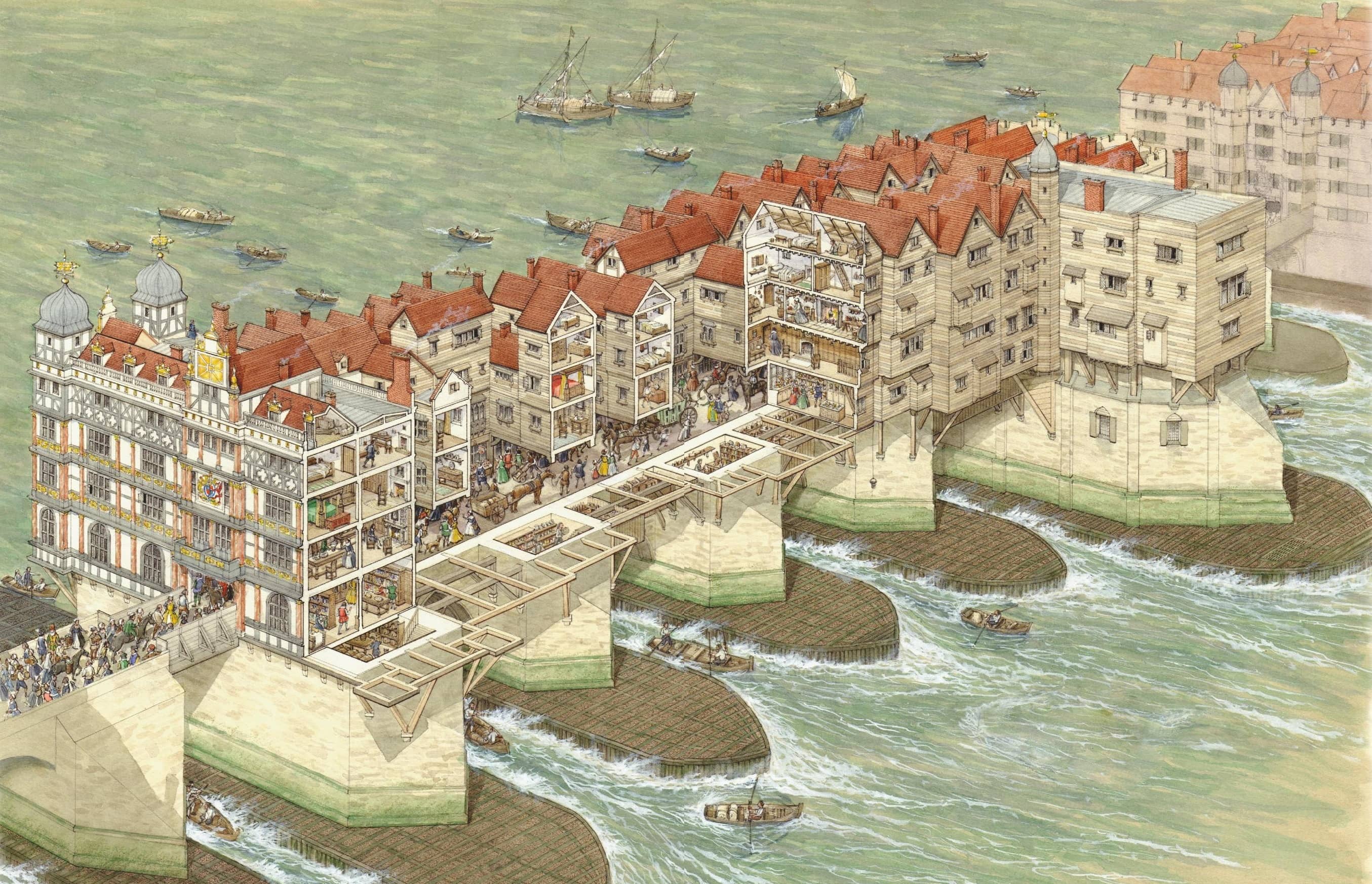
A reconstruction drawing of London Bridge in about 1590 by Stephen Conlin, specially commissioned for Country Life. It shows the middle section of the bridge, with the spectacular façade of Nonsuch House to the left and the medieval chapel, converted into a house, on the large pier to the right. The cutaway shows the arrangement of houses along the bridge, as well as the massive hammer beams laid parallel to the roadway that supported them. Notice the cellars created within the piers or slung beneath the hammer beams. The house interior shown follows the standard plan of ground-floor shop, first-floor hall, second-floor kitchen and chambers and garrets above. Cross buildings spanned the roadway at intervals and created an intermittent tunnel; at least one foreign visitor walked along the street without realising he had crossed a river. Water for the houses was hauled from the river. The enormous starlings restricted the flow of the river and, at low tide, created treacherous shoots of water between the piers. This restricted flow stilled the water upstream of the bridge and made it easier for it to freeze over.
OLD LONDON BRIDGE, lined with rickety-looking wooden houses, was by far the longest inhabited bridge in Europe, with the homes of more than 500 people—the equivalent of a small town—perched above the rushing waters of the Thames. It was also a crucial part of London’s road network, a principal shopping street and much admired by foreign visitors. A Frenchman, L. Grenade, wrote in 1578 that ‘there is no bridge in the whole of Europe which is on a great river like the Thames and as formidable, as spectacular and as bustling with trade as this bridge in London’. He ranked it with St Paul’s Cathedral, the Royal Exchange and the Tower as one of London’s most impressive structures.
Esta historia es de la edición October 9, 2019 de Country Life UK.
Comience su prueba gratuita de Magzter GOLD de 7 días para acceder a miles de historias premium seleccionadas y a más de 9,000 revistas y periódicos.
Ya eres suscriptor ? Conectar
Esta historia es de la edición October 9, 2019 de Country Life UK.
Comience su prueba gratuita de Magzter GOLD de 7 días para acceder a miles de historias premium seleccionadas y a más de 9,000 revistas y periódicos.
Ya eres suscriptor? Conectar

Give it some stick
Galloping through the imagination, competitive hobby-horsing is a gymnastic sport on the rise in Britain, discovers Sybilla Hart

Paper escapes
Steven King selects his best travel books of 2024

For love, not money
This year may have marked the end of brag-art’, bought merely to show off one’s wealth. It’s time for a return to looking for connoisseurship, beauty and taste

Mary I: more bruised than bloody
Cast as a sanguinary tyrant, our first Queen Regnant may not deserve her brutal reputation, believes Geoffrey Munn

A love supreme
Art brought together 19th-century Norwich couple Joseph and Emily Stannard, who shared a passion for painting, but their destiny would be dramatically different

Private views
One of the best ways-often the only way-to visit the finest privately owned gardens in the country is by joining an exclusive tour. Non Morris does exactly that

Shhhhhh...
THERE is great delight to be had poring over the front pages of COUNTRY LIFE each week, dreaming of what life would be like in a Scottish castle (so reasonably priced, but do bear in mind the midges) or a townhouse in London’s Eaton Square (worth a king’s ransom, but, oh dear, the traffic) or perhaps that cottage in the Cotswolds (if you don’t mind standing next to Hollywood A-listers in the queue at Daylesford). The estate agent’s particulars will give you details of acreage, proximity to schools and railway stations, but never—no, never—an indication of noise levels.

Mission impossible
Rubble and ruin were all that remained of the early-19th-century Villa Frere and its gardens, planted by the English diplomat John Hookham Frere, until a group of dedicated volunteers came to its rescue. Josephine Tyndale-Biscoe tells the story

When a perfect storm hits
Weather, wars, elections and financial uncertainty all conspired against high-end house sales this year, but there were still some spectacular deals

Give the dog a bone
Man's best friend still needs to eat like its Lupus forebears, believes Jonathan Self, when it's not guarding food, greeting us or destroying our upholstery, of course